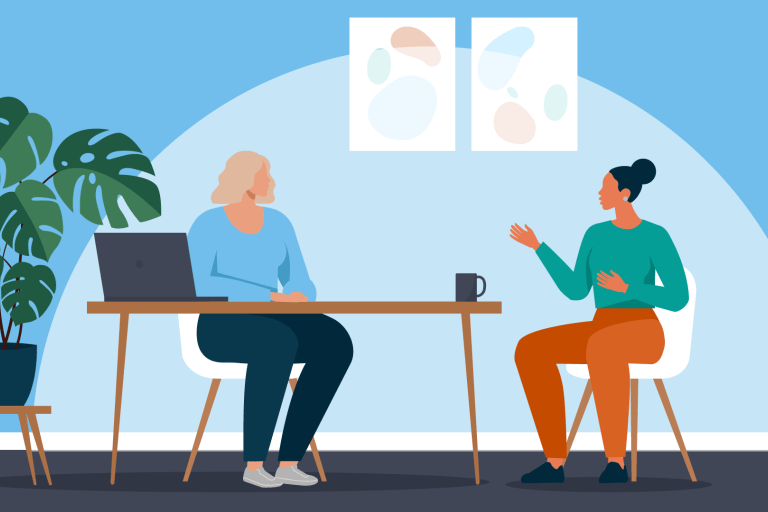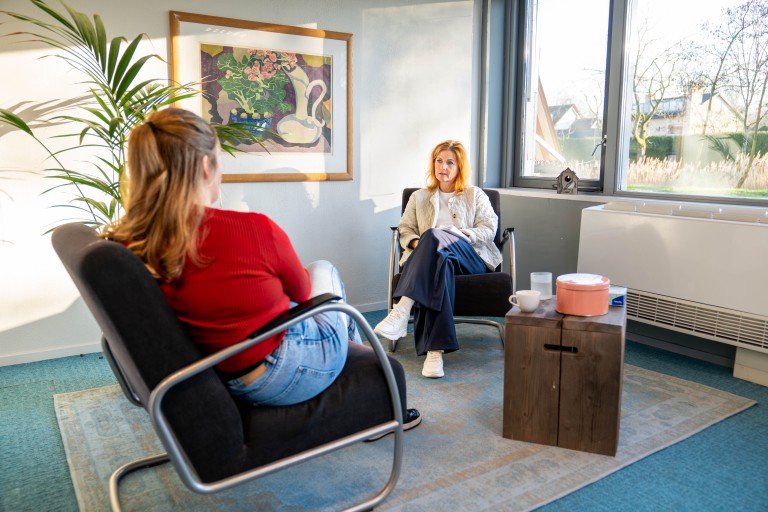What does a confidential counsellor do?
Anyone working or studying at BUas can contact the confidential counsellors.
- The confidential counsellor listens to you and takes time for your story.
- The confidential counsellor stands beside you. They provide information if you have questions and help you find the solution that best suits your situation.
- The confidential counsellor only takes action with your consent. You remain in charge and everything you discuss with the confidential advisor is and remains confidential.
- If necessary, the confidential counsellor refers you to external professionals.
- The confidential counsellor can also help you file a complaint with the complaints committee.
In short, with a confidential counsellor you can safely share your story and ask for advice, you decide what happens, and you can also just vent about undesired situations or behaviour.
Contact our confidential counsellors
You can contact the confidential counsellors by sending an e-mail to:
Staff members are also offered the possibility of contacting an external confidential counsellor. In this case, please send an e-mail to: [email protected].
What happens if you make a report?
You can contact the confidential counsellors if you have experienced (sexual) harassment, (verbal) aggression, violence, bullying or discrimination.
It may involve undesired behaviour that directly affects you, or, as a bystander, it could be witnessing someone else being subjected to such behaviour. If you feel uncomfortable due to behaviour that causes stress, problems, or impacts your job satisfaction, you can reach out to the confidential counsellor for undesired behaviour.
What can I expect from a conversation with a confidential counsellor?
- Step 1: the first appointment – a safe space for your story
The confidential counsellor will invite you for a meeting, which can take place by phone, online or at a safe location on campus. They will reassure you that the conversation is completely confidential and that any action will only be taken with your consent. During this meeting, the confidential counsellor will ask you if you want to talk about what happened, giving you the time and space to speak openly. If you have any questions, the confidential counsellor will give you information and, if you wish, you can make a follow-up appointment afterwards.
- Step 2: the follow-up appointment – a talk about possible solutions
Together with you, the confidential counsellor will explore the possible solutions for your situation. They will outline several options, explaining the pros and cons of each one. You remain in charge. It is very important that you feel you can support the chosen solution. Do you need more time to think? No problem, you set the pace.
- Step 3: choosing a course of action
Together with the confidential counsellor, you will discuss the next step and choose a course of action. In this respect, you may think of:
- Having a conversation with the person exhibiting the undesired behaviour (with the confidential counsellor present, if necessary).
- Having a conversation with a manager about the situation (employees).
- Putting down on paper what happened to you and send your story (directly or via the confidential counsellor) to a manager or director.
- Filing a complaint with the complaints committee.
- Doing nothing.
- The confidential counsellor may refer you to other professionals or specialist care, if needed.
- Step 4: evaluation and, if needed, follow-up
The confidential counsellor will discuss with you whether your issue has been sufficiently resolved and whether any follow-up steps are needed.
- In the event of undesired behaviour
-
It may involve undesired behaviour that directly affects you, or, as a bystander, it could be witnessing someone else being subjected to such behaviour. If you feel uncomfortable due to behaviour that causes stress, problems, or impacts your job satisfaction, you can reach out to the confidential counsellor for undesired behaviour.
What can I expect from a conversation with a confidential counsellor?
- Step 1: the first appointment – a safe space for your story
The confidential counsellor will invite you for a meeting, which can take place by phone, online or at a safe location on campus. They will reassure you that the conversation is completely confidential and that any action will only be taken with your consent. During this meeting, the confidential counsellor will ask you if you want to talk about what happened, giving you the time and space to speak openly. If you have any questions, the confidential counsellor will give you information and, if you wish, you can make a follow-up appointment afterwards.
- Step 2: the follow-up appointment – a talk about possible solutions
Together with you, the confidential counsellor will explore the possible solutions for your situation. They will outline several options, explaining the pros and cons of each one. You remain in charge. It is very important that you feel you can support the chosen solution. Do you need more time to think? No problem, you set the pace.
- Step 3: choosing a course of action
Together with the confidential counsellor, you will discuss the next step and choose a course of action. In this respect, you may think of:
- Having a conversation with the person exhibiting the undesired behaviour (with the confidential counsellor present, if necessary).
- Having a conversation with a manager about the situation (employees).
- Putting down on paper what happened to you and send your story (directly or via the confidential counsellor) to a manager or director.
- Filing a complaint with the complaints committee.
- Doing nothing.
- The confidential counsellor may refer you to other professionals or specialist care, if needed.
- Step 4: evaluation and, if needed, follow-up
The confidential counsellor will discuss with you whether your issue has been sufficiently resolved and whether any follow-up steps are needed.
Frequently asked questions
Have you experienced unwanted behaviour on campus or related to your studies or work? A confidential counsellor at BUas can help you. Read the frequently asked questions below to find out what to expect.
- Is the BUas confidential counsellor independent?
The confidant is independent, but stands beside you, making them inherently biased. As a result, they cannot conduct investigations or act as a mediator. They can, however, support you during a difficult conversation. The confidential counsellor represents only your interests and will maintain strict confidentiality.
- Is a confidential counsellor the right person for me to contact?
The confidential counsellor for unwanted behaviour is the right person to contact if you have experienced or are experiencing behaviour that makes you uncomfortable, causes stress, creates problems, or reduces your job satisfaction. This includes behaviours such as (sexual) harassment, discrimination, aggression, violence and bullying. The confidential counsellor will always listen to your story, and welcome you to discuss your concerns openly.
- Is my conversation always confidential?
Yes, your communication with a confidential counsellor is always confidential. Confidential counsellors work according to the guidelines of the Landelijke Vereniging voor Vertrouwenspersonen (National Association of Confidential Counsellors) and will handle all reports with strict confidentiality and anonymity. The counsellor is there to support you and prioritises your interests. Any action regarding your situation will only be taken with your consent – you remain in charge.
Confidentiality can only be breached under strict conditions. If you disclose a serious criminal offence with a high risk of repetition, the confidential counsellor is obligated to take appropriate action. In rare cases where the counsellor is personally distressed by your story, confidentiality may also be breached to raise internal concerns. This will always be discussed with your first. The confidential counsellor will make every effort to protect your anonymity and prevent traceability.
In legal proceedings, confidential counsellors do not have a statutory duty of confidentiality. A judge may oblige the confidential counsellor to provide answers
- Who can contact a confidential counsellor?
Anyone who studies or works at BUas and who is faced with unwanted behaviour can contact a confidential counsellor.
- What are the tasks of a confidential counsellor?
- Provide initial (emotional) support to students and staff who have experienced or are experiencing unwanted behaviour and need help and advice;
- Explore whether a solution can be found informally, and provide support to the person reporting the unwanted behaviour (person concerned) as needed;
- Inform the person concerned about other (formal) options for solutions, such as complaints procedures;
- Support the person concerned if they wish to bring the matter to the attention of a complaints committee, the person exhibiting the unwanted behaviour, or the management of BUas;
- Refer the person concerned to other assistance agencies, for example a mediator, if necessary;
- Provide aftercare;
- Provide information about the course of action to address the unwanted behaviour;
- Advise and support managers and directors of BUas, solicited and unsolicited, on the prevention of unwanted behaviour;
- Register reports of unwanted behaviour.
- What are not tasks of a confidential counsellor?
- Confidential counsellors are not an emergency point for acute help. For that, it is best to contact your GP, 112, 113 or the police.
- Confidential counsellors will not take over conversations or problems from you. You remain in charge.
- Confidential counsellors cannot mediate between you and another party as independent third parties as confidential counsellors stand by your side and represent only your interests.
- Confidential counsellors do not engage in fact-finding, conduct investigations, or interview witnesses.
- Confidential counsellors have no role in (impending) mark/assessment or labour disputes and/or discussions about performance.
- Confidential counsellors do not take reports from groups, only from individuals. If a problem affects several people, each individual concerned should go to a confidential counsellor.
More information about social safety

Code of conduct
The code of conduct consists of guidelines regarding the way we interact with each other; with integrity and respect.

How do we treat each other
A brief summary of the most important rules of conduct within BUas can be found here.

Governance
BUas strives to ensure transparency and accountability to all its stakeholders. On this page you will find regulations and guidelines and more information about the Legal Protection Service.
